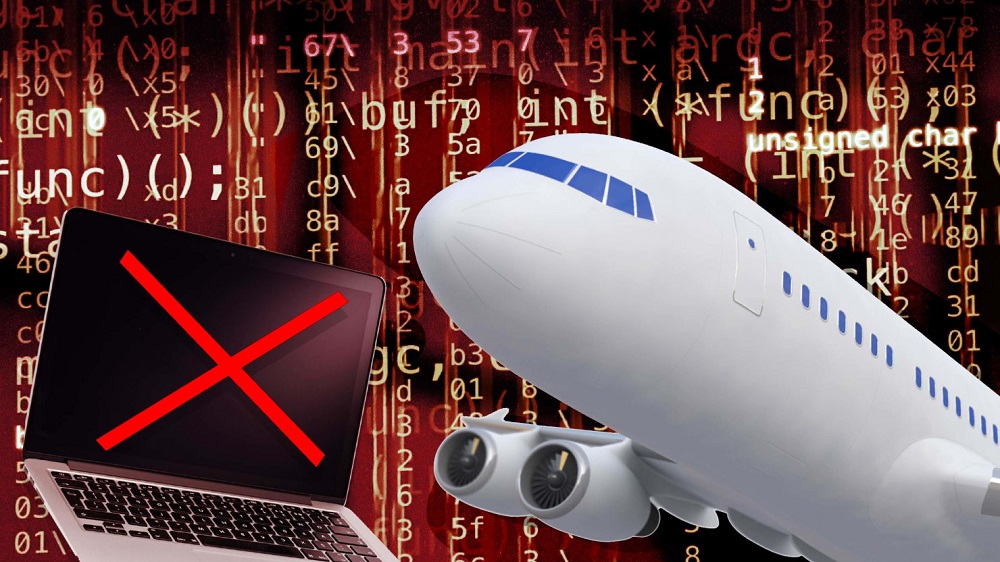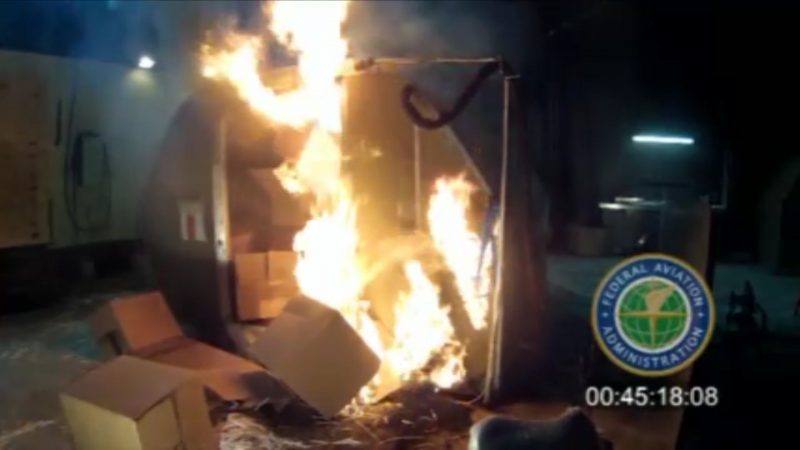
Any of those that fly regularly know that having distractions like your laptop, tablet, MP3 player or smartphone are a necessity to either get work done or just get you through all the flytime.
Restrictions continue coming from the FAA, and now laptops are on the firing line from even being allowed in your checked baggage. How will that affect business travelers?
The U.S. government is urging the world airline community to ban large, personal electronic devices like laptops from checked luggage because of the potential for a catastrophic fire.
The Federal Aviation Administration said in a paper filed recently with a U.N. agency that its tests show that when a laptop’s rechargeable lithium-ion battery overheats in close proximity to an aerosol spray can, it can cause an explosion capable of disabling an airliner’s fire suppression system. The fire could then rage unchecked, leading to “the loss of the aircraft,” the paper said.
The U.N. agency, the International Civil Aviation Organization, sets global aviation safety standards, although member countries must still ratify them. The proposed ban is on the agenda of a meeting of ICAO’s panel on dangerous goods being held this week and next week in Montreal.
The FAA has conducted 10 tests involving a fully-charged laptop packed in a suitcase. A heater was placed against the laptop’s battery to force it into “thermal runaway,” a condition in which the battery’s temperature continually rises.
In one test, an 8-ounce aerosol can of dry shampoo —which is permitted in checked baggage — was strapped to the laptop. There was a fire almost immediately and it grew rapidly. The aerosol can exploded within 40 seconds.
The test showed that because of the rapid progression of the fire, Halon gas fire suppressant systems used in airline cargo compartments would be unable to put out the fire before there was an explosion, the FAA said. The explosion might not be strong enough to structurally damage the plane, but it could damage the cargo compartment and allow the Halon to escape, the agency said. Then there would be nothing to prevent the fire from spreading.
Other tests of laptop batteries packed with potentially dangerous consumer goods that are permitted in checked baggage like nail polish remover, hand sanitizer and rubbing alcohol also resulted in large fires, although no explosions.
As a result, the paper recommends that passengers shouldn’t be allowed to pack large electronic devices in baggage unless they have specific approval from the airline. The paper says the European Safety Agency, the FAA’s counterpart in Europe; Airbus, one of the world’s largest makers of passenger airliners; the International Federation of Airline Pilots’ Association, and the International Coordinating Council of Aerospace Industries Association, which represents aircraft makers, concurred in the recommendation.
The paper doesn’t address whether the ban should extend to domestic flights, but points out the risk that baggage containing a large electronic device could be transferred from one flight to another without the knowledge of the airline. The FAA said it believes most devices larger than a smartphone are already being carried by passengers into the cabin, rather than put in checked bags.
Rechargeable lithium batteries are used in consumer products ranging from cellphones and laptops to electric cars. Manufacturers like them because they pack more energy into smaller packages, but the batteries can self-ignite if they have a manufacturing flaw, are damaged, exposed to excessive heat, overcharged or packed too closely together. The fires can burn up to 1,100 degrees Fahrenheit, close to the melting point of the aluminum used in aircraft construction.
Since 2006, three cargo jets have been destroyed and four pilots killed by in-flight fires that investigators say were either started by batteries or made more severe by their proximity.
Earlier this year, the U.S. imposed a ban on laptops in the cabins of planes coming into the country from 10 Middle Eastern airports for security reasons. The ban was fully lifted in July after U.S. officials said airports in the region had taken other steps to increase security.
The Pipeline and Hazardous Materials Safety Administration formerly led the U.S. negotiations on the regulation of dangerous goods at ICAO meetings. But the Obama administration put the FAA in charge in 2009 after congressional Democrats accused high-level officials at PHMSA of being too cozy with the industries they regulate.
Transportation Secretary Elaine Chao has now decided to put PHMSA back in charge at future ICAO dangerous goods deliberations, Rep. Peter DeFazio, D-Ore., said Thursday. Both agencies are part of the Transportation Department.
DeFazio called the decision “inexplicable” in a letter to Chao.
“I strongly believe it has the potential to put the lives of airline passengers and crews at serious risk,” he said.
Chao didn’t immediately respond to a request for comment. Lobbyists for lithium battery makers and companies that use the batteries in their products have previously urged the change.
First, the U.S. government temporarily banned laptops in the cabins of some airplanes. Now it is looking to ban them on from checked luggage on international flights, citing the risk of potentially catastrophic fires.
The Federal Aviation Administration recently recommended that the U.N. agency that sets global aviation standards prohibit passengers from putting laptops and other large personal electronic devices in their checked bags.
The FAA says in a filing with the International Civil Aviation Organization that the lithium-ion batteries in laptops can overheat and create fires.
Some questions and answers about the shifting U.S. policy.
WHY IS THE FAA WORRIED ABOUT THIS DANGER NOW?
The FAA has long been concerned about the potential hazardous of lithium batteries. The agency’s tests of the risks of shipping large quantities of batteries as cargo on airliners showed that when a single battery overheats, it can cause other nearby batteries to overheat as well. That can result in intense fires and the release of explosive gases.
Based on those test results, the FAA was able to convince ICAO two years ago to ban cargo shipments of lithium batteries on passenger planes and to require that batteries shipped on cargo planes be charged no more than 30 percent. The risk of overheating is lower if the battery isn’t fully charged.
More recently, the FAA conducted 10 tests of fully charged laptops packed in suitcases. In one test, an 8-ounce aerosol can of dry shampoo —which is permitted in checked baggage — was strapped to the laptop. A heater was placed against the laptop’s battery to force it into “thermal runaway,” a condition in which the battery’s temperature continually rises. There was a fire almost immediately and an explosion within 40 seconds with enough force to potentially disable the fire suppression system.
Other tests of laptop batteries packed in suitcases with goods like nail polish remover, hand sanitizer and rubbing alcohol also resulted in large fires, although no explosions.
ISN’T THE GOVERNMENT CONTRADICTING ITSELF BY FIRST SAY LAPTOPS SHOULD BE CHECKED, THEN SAYING THEY SHOULDN’T?
The different messages are the result of two agencies with different missions: security versus safety.
Last March, the Department of Homeland Security imposed a ban on laptops in the cabins of planes coming into the U.S. from 10 Middle Eastern airports to prevent them from being used as a tool in an attack. Many passengers put their laptops in their checked bags instead. The ban was fully lifted in July after airports in the region took steps to improve security.
This ban is being sought by the FAA, which is focused on the risk of an accidental explosion more than the prospect of a terrorist attack.
WHEN WILL THIS GO INTO EFFECT?
There are no guarantees that there will be a ban on packing laptops in checked bags.
The FAA is presenting its case at a meeting this week and next of ICAO’s dangerous goods panel. European aviation safety regulators, aircraft manufacturers and pilots’ unions have endorsed the proposal.
Even if the panel were to agree with the proposal, it would still need to be adopted at higher levels of ICAO. And it would only apply to international flights.
WILL THE U.S. IMPOSE A BAN ON CHECKING LAPTOPS ON DOMESTIC FLIGHTS?
This is unclear. Individual countries can decide whether to implement domestic bans. The United States has not indicated if it will do so.
The effect of such a ban may not be great, since many passengers don’t check bags to avoid surcharges, and those that do often prefer to carry on electronics.
WILL THE U.S. CONTINUE TO PUSH FOR THE INTERNATIONAL BAN?
This is also unclear. The FAA, which favors the ban, is handling negotiations for the U.S. at the ICAO meeting. But, for future meetings, Transportation Secretary Elaine Chao is having another agency, the Pipeline and Hazardous Materials Safety Administration, take the lead.
It’s not clear if that agency, known as PHMSA, will share the FAA’s position.
PHMSA previously led dangerous goods negotiations, but the Obama administration put the FAA in charge after congressional Democrats complained that PHMSA officials were too cozy with the industries they regulated.
The Transportation Department said in a statement that PHMSA “has a unique and highly effective” approach to regulating the transportation of hazardous materials, and that it will consider what impact any change in aviation rules might have on transportation. The statement also said PHMSA will collaborate with the FAA.


